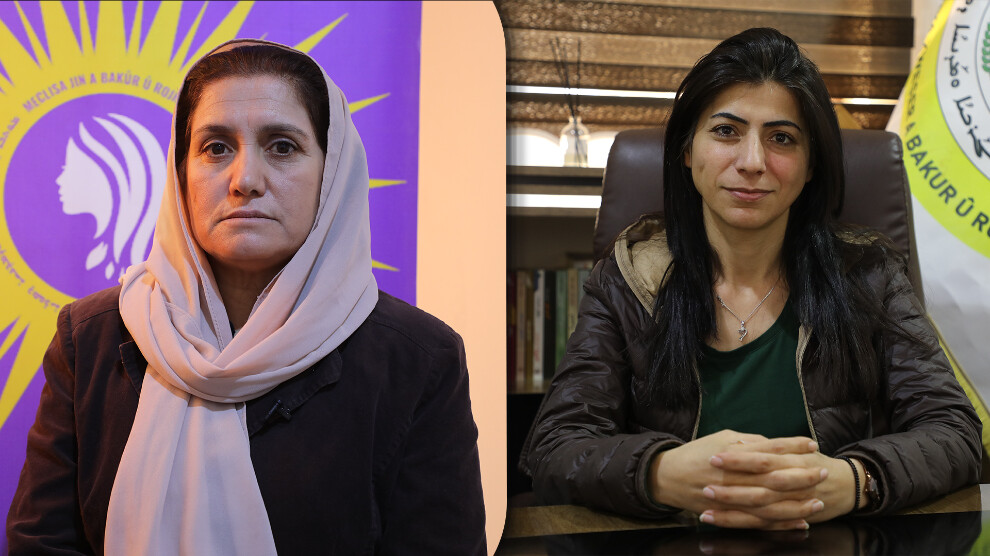Family law protects rights of women and children in NE Syria
One of the achievements of women's struggle in North and East Syria is the “Family Law” that protects the rights of women and children and spreads the idea of common life in society.

DİREN ENGÎZEK
Raqqa- In North and East Syria, women continue to build a new life with the philosophy of “Jin, Jiyan, Azadi” (Women, Life, Freedom). One of the achievements of women’s struggle was the “Women’s Law” adopted in 2014 after the establishment of the Autonomous Administration of North and East Syria (AANES).
In 2020, the name of the Women’s Law was changed to “Family Law”. Consisting of six sections, the Family Law covers issues such as marriage, divorce and child custody and bans female genital mutilation, polygamy and child marriage. The law also protects the rights of women and children.
Difficulties in the implementation of the law in cities liberated from ISIS
The implementation of the Family Law is more important in cities liberated from ISIS such as Raqqa, Tabqa, Manbij and Deir ez-Zor. In these cities, where Arab, Turkmen, Circassian and Kurdish women are oppressed by families and tribes, the implementation of the law is very difficult because men do not accept it.
‘The idea of common life spreads in society’
In an interview with NuJINHA, Adalet Ömer, head of the Women’s Council of North and East Syria, spoke about Family Law. “After the establishment of the AANES, women wanted their rights to be legally guaranteed,” she said, recalling that women led the revolution in Rojava.
“One of the most important achievements of the revolution is that the idea of common life spreads in society. We believe that women and men can have a common life. Before the revolution, there was a discriminatory system. After the revolution, women began to participate in politics, social and cultural life. They demanded a law protecting their rights. The difference between the revolution in Rojava and other revolutions is that women lead the revolution in Rojava and this revolution is also known as women’s revolution.”
‘Women struggled and took their legal rights’
Emphasizing that women played very important roles in revolutions throughout history, Adalet Ömer said, “The women in North and East Syria formed their own military forces and participated in all facets of life. They struggled and took their legal rights. In the Middle East, women, unfortunately, have no rights; religions, customs and traditions encourage, justify gender discrimination, and violate women's rights.”
‘This law was adopted to protect the rights of women and children’
Adalet Ömer also spoke about the Women’s Law adopted in 2014. “The Women’s Law was based on equality and democracy. In the Middle East, men are considered to be the heads of families. Women and children have no right. Men and women are not equal. The Women’s Law was adopted to protect the rights of women and children. We conducted family visits in Cizre, Kobane and Afrin cantons to raise awareness about the rights of women and children. After the liberation of Raqqa, Manbij and Deir ez-Zor from ISIS, we conducted family visits there.”
The change of the name
Adalet Ömer said that the name of the Women’s Law was changed to “Family Law” in 2020. “Because the Women’s Law was only about women’s rights. We changed its name because we wanted to include children’s rights. The Family Law protects not only women’s rights but also children’s rights. Free society requires free families.”
They organized many activities
The Women’s Council of North and East Syria has organized many activities so that the Family Law was accepted in society. “We organize many activities especially in liberated areas such as Raqqa, Tabqa, Manbij and Deir ez-Zor. We work to break the traditions that oppress women. We have held seminars and meetings to listen to both women and men.”
‘A free life can be built by free women’
Pointing to important achievements of women in North and East Syria, she said, “Women have taken their rights and become role models all around the world. The AANES adopts the co-presidency system in all political, social, administrative, and other fields. There is an equal participation of men and women. Women paid heavy prices to build this system; our female comrades were martyred. We will never give up on struggling for the freedom of all women. A free life can be built by free women.”
Feyruz Xelil: People accept the Family Law
Feyruz Xelil, member of the Women’s Council of North and East Syria, told us the Family Law was accepted more by women. In 2020, the law began to be implemented in regions mostly populated by Arabs.
“We carried out many activities in many cities, especially in Raqqa, Tabqa, Manbij and Deir ez-Zor. Women had no right to inherit. They could not get child custody. We have conducted family visits in these cities and discussed these issues with the people and tribal leaders. Now, people accept Family Law.”
Feyruz Xelil also talked about the change in society after the cities were liberated from ISIS. “When these cities were controlled by ISIS, girls were forced into child marriage and men could have two or three wives. After they were liberated from ISIS, we carried out many activities. Now, the Family Law is implemented in these cities.”
